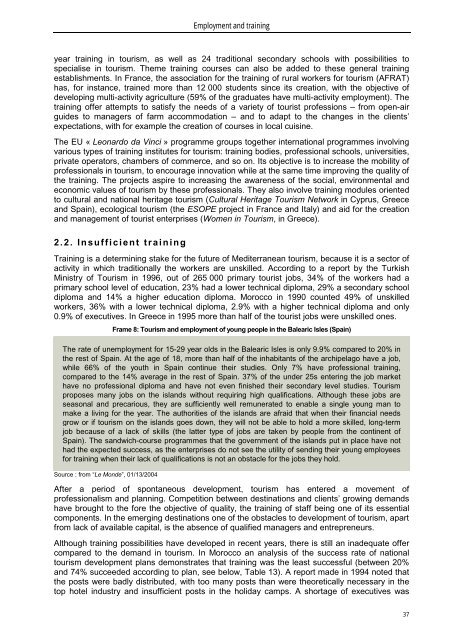dossier sur le tourisme et le développement durable
dossier sur le tourisme et le développement durable
dossier sur le tourisme et le développement durable
You also want an ePaper? Increase the reach of your titles
YUMPU automatically turns print PDFs into web optimized ePapers that Google loves.
Employment and training<br />
year training in tourism, as well as 24 traditional secondary schools with possibilities to<br />
specialise in tourism. Theme training courses can also be added to these general training<br />
establishments. In France, the association for the training of rural workers for tourism (AFRAT)<br />
has, for instance, trained more than 12 000 students since its creation, with the objective of<br />
developing multi-activity agriculture (59% of the graduates have multi-activity employment). The<br />
training offer attempts to satisfy the needs of a vari<strong>et</strong>y of tourist professions – from open-air<br />
guides to managers of farm accommodation – and to adapt to the changes in the clients’<br />
expectations, with for examp<strong>le</strong> the creation of courses in local cuisine.<br />
The EU « Leonardo da Vinci » programme groups tog<strong>et</strong>her international programmes involving<br />
various types of training institutes for tourism: training bodies, professional schools, universities,<br />
private operators, chambers of commerce, and so on. Its objective is to increase the mobility of<br />
professionals in tourism, to encourage innovation whi<strong>le</strong> at the same time improving the quality of<br />
the training. The projects aspire to increasing the awareness of the social, environmental and<br />
economic values of tourism by these professionals. They also involve training modu<strong>le</strong>s oriented<br />
to cultural and national heritage tourism (Cultural Heritage Tourism N<strong>et</strong>work in Cyprus, Greece<br />
and Spain), ecological tourism (the ESOPE project in France and Italy) and aid for the creation<br />
and management of tourist enterprises (Women in Tourism, in Greece).<br />
2.2. Insufficient training<br />
Training is a d<strong>et</strong>ermining stake for the future of Mediterranean tourism, because it is a sector of<br />
activity in which traditionally the workers are unskil<strong>le</strong>d. According to a report by the Turkish<br />
Ministry of Tourism in 1996, out of 265 000 primary tourist jobs, 34% of the workers had a<br />
primary school <strong>le</strong>vel of education, 23% had a lower technical diploma, 29% a secondary school<br />
diploma and 14% a higher education diploma. Morocco in 1990 counted 49% of unskil<strong>le</strong>d<br />
workers, 36% with a lower technical diploma, 2.9% with a higher technical diploma and only<br />
0.9% of executives. In Greece in 1995 more than half of the tourist jobs were unskil<strong>le</strong>d ones.<br />
Frame 8: Tourism and employment of young peop<strong>le</strong> in the Ba<strong>le</strong>aric Is<strong>le</strong>s (Spain)<br />
The rate of unemployment for 15-29 year olds in the Ba<strong>le</strong>aric Is<strong>le</strong>s is only 9.9% compared to 20% in<br />
the rest of Spain. At the age of 18, more than half of the inhabitants of the archipelago have a job,<br />
whi<strong>le</strong> 66% of the youth in Spain continue their studies. Only 7% have professional training,<br />
compared to the 14% average in the rest of Spain. 37% of the under 25s entering the job mark<strong>et</strong><br />
have no professional diploma and have not even finished their secondary <strong>le</strong>vel studies. Tourism<br />
proposes many jobs on the islands without requiring high qualifications. Although these jobs are<br />
seasonal and precarious, they are sufficiently well remunerated to enab<strong>le</strong> a sing<strong>le</strong> young man to<br />
make a living for the year. The authorities of the islands are afraid that when their financial needs<br />
grow or if tourism on the islands goes down, they will not be ab<strong>le</strong> to hold a more skil<strong>le</strong>d, long-term<br />
job because of a lack of skills (the latter type of jobs are taken by peop<strong>le</strong> from the continent of<br />
Spain). The sandwich-course programmes that the government of the islands put in place have not<br />
had the expected success, as the enterprises do not see the utility of sending their young employees<br />
for training when their lack of qualifications is not an obstac<strong>le</strong> for the jobs they hold.<br />
Source : from “Le Monde”, 01/13/2004<br />
After a period of spontaneous development, tourism has entered a movement of<br />
professionalism and planning. Comp<strong>et</strong>ition b<strong>et</strong>ween destinations and clients’ growing demands<br />
have brought to the fore the objective of quality, the training of staff being one of its essential<br />
components. In the emerging destinations one of the obstac<strong>le</strong>s to development of tourism, apart<br />
from lack of availab<strong>le</strong> capital, is the absence of qualified managers and entrepreneurs.<br />
Although training possibilities have developed in recent years, there is still an inadequate offer<br />
compared to the demand in tourism. In Morocco an analysis of the success rate of national<br />
tourism development plans demonstrates that training was the <strong>le</strong>ast successful (b<strong>et</strong>ween 20%<br />
and 74% succeeded according to plan, see below, Tab<strong>le</strong> 13). A report made in 1994 noted that<br />
the posts were badly distributed, with too many posts than were theor<strong>et</strong>ically necessary in the<br />
top hotel industry and insufficient posts in the holiday camps. A shortage of executives was<br />
37
















